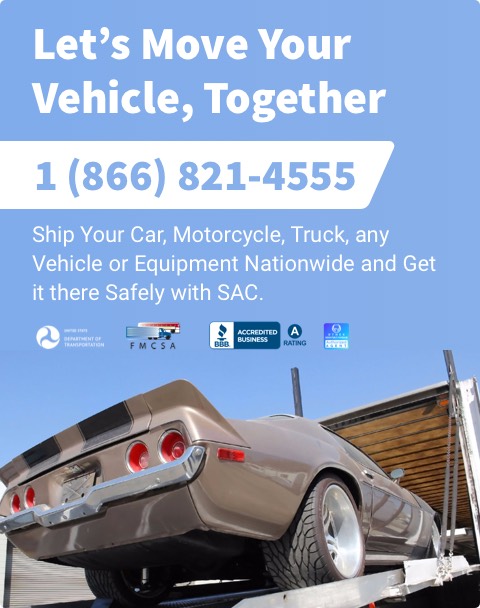Learn about the ground-breaking Houston Truckport, an initiative between Ryder and Kodiak Robotics that represents a significant advancement in autonomous transportation in the United States. This facility initiates the first autonomous operation in Kodiak, a significant milestone for the sector. The partnership with Ryder’s fleet services is poised to transform freight transportation.
This blog post explores the details of New York City’s congestion pricing proposal, emphasizing the court battle with New Jersey on budgetary and constitutional issues. It investigates the difficulties experienced by interstate commuters and throws light on the possible effects on the economy and environment. The article highlights Ship A Car, Inc.’s position as a top auto shipping company that can handle these challenging transportation situations in the middle of these developments.
The FMCSA’s proposal to update the country’s motor carrier safety fitness determination regulations is examined in detail in this extensive blog article. It explores the major studies driving these modifications, examines the reactions of the public and business community, and talks about the shortcomings of the existing framework. The article also discusses the possible benefits of new approaches and technology for improving traffic safety.
With the introduction of autonomous trucks, the United States is poised for a revolution in transportation. This trend is being led by industry leaders like Aurora, Kodiak, and Gatik and is being powered by cutting-edge AI and sensor technologies. These driverless cars provide more economy and safety, but they also bring up serious issues with legislation and job security. The degree to which this technology can be seamlessly incorporated into the current transportation infrastructure will determine how successful it is.

We discuss the most recently implemented changes to the U.S. EV tax credit program in this blog article, emphasizing the IRS ECO site and the lengthening of dealer reporting deadlines. We discuss the changes that will occur in 2024, such as the increased qualifying requirements and the transfer of clean car credits. Additionally covered are the IRS dealer help resources.
This blog article explores the anticipated shifts in the US freight business in 2024. It looks at labor practices, regulatory modifications, and environmental requirements, providing insights into how these changes may affect the sector. With a focus on efficiency, sustainability, and rising to new challenges, the goal is to equip companies for the changing freight landscape.
Learn about the vital role played by the Alaska Highway in North America and the noteworthy improvements made at Pink Mountain. Discover the benefits to local and regional economies, the participation of indigenous people, and the $3.9 million project that will improve road safety.
Greenlane, supported by Daimler and Uber Freight, will revolutionize U.S. commercial transportation with its electric recharge stations. In 2024, this company will promote sustainable transportation and ESG goals, marking a transition in the trucking sector. Greenlane is ready to enable electrified long-haul trucks and a cleaner transportation future with key sites and collaborations.

This article explores GM’s innovative decision to supply Autocar’s heavy-duty vehicles with hydrogen fuel cells. It looks at the benefits of this technology, what it means for the business, how regulations are changing, and how the economy is affecting the move to more environmentally friendly heavy-duty transportation options.
This article looks at Tesla’s historic recall, which affected more than 2 million cars in the US and was brought on by safety concerns with the Autopilot. It looks at the scope of the recall, the critical role played by the NHTSA, Tesla’s calculated reaction, the potential legal repercussions, and the inherent difficulties with Autopilot technology.
This blog article looks at the recent changes in the US freight sector, emphasizing the rise of West Coast ports and Atlanta’s falling market share. It explores the environmental, geopolitical, and economic forces behind these shifts and talks about how they will affect companies and the freight sector going forward.
The Federal Motor Carrier Safety Administration has decided to remove 10 Electronic Logging Devices due to non-compliance, and this blog post explores their reasoning. It addresses the consequences for carriers and drivers, the possibility of device reinstatement, critiques the ELD self-certification procedure, and emphasizes Ship A Car, Inc.’s dedication to industry leadership and compliance with regulations.

This blog post addresses Florida’s plan to expedite the CDL testing process by permitting candidates to retake just the exam sections that they failed. It draws attention to the difficulties that exist now, the changes that have been suggested, the effects of ELDT legislation, industry support, and the possibility of achieving more efficiency without sacrificing safety.
This blog post explores the ‘freight recession’ harming the transportation sector in the United States, looking at its causes, the pandemic’s effects, and case studies of significant players. It provides insights into resilience tactics, stressing the value of human interaction, adaptability, and partnerships in navigating these trying times.
Warren Buffett’s Berkshire Hathaway faces a challenging legal dispute over its investment in Pilot Travel Centers. This blog post delves into the origins of the conflict, the legal controversy surrounding accounting practices, and the broader implications for corporate ethics and Buffett’s reputation.
